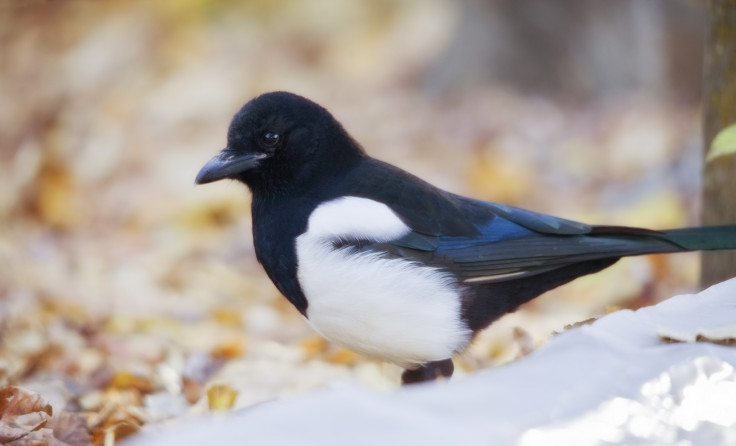Myth Busted: Magpies Don't Steal Shiny Objects – They are Scared of Them

Magpies do not steal shiny objects to take back to their nests, scientists have discovered, dispelling a long-held myth about the distinctive bird.
In Europe, magpies, or Pica pica, are associated with many superstitions, including their tendency to steal shiny things – and are regarded as a thief as a result. The Collins English Dictionary also lists one definition of magpie as "a person who hoards small objects".
However, psychologists at the University of Exeter's Centre for Research in Animal Behaviour, have shown that the opposite is in fact true. Magpies are frightened of unfamiliar and new objects.
Toni Shephard, lead author of the study, said: "We did not find evidence of an unconditional attraction to shiny objects in magpies. Instead, all objects prompted responses indicating neophobia – fear of new things – in the birds."
Researchers carried out a number of experiments with both wild magpies and ones that had come from a rescue centre.
In the tests, scientists sued shiny metal screws, small foil rings and a small piece of aluminium foil. Half of the rings and screws were painted blue with matt paint, while the rest were left their shiny silver colour.

The researchers then put out two lose piles of nuts with two piles of shiny and non-shiny objects located 30cm away.
In 64 tests, the magpies only came into contact with the shiny objects twice – both times a silver ring was picked up, but it was immediately discarded. The rest of the shiny and non-shiny objects were ignored, with magpies displaying wary behaviour by feeding less in their presence.
Shephard said: "We suggest that humans notice when magpies occasionally pick up shiny objects because they believe the birds find them attractive, while it goes unnoticed when magpies interact with less eye-catching items. It seems likely, therefore, that the folklore surrounding them is a result of cultural generalisation and anecdotes rather than evidence."
Natalie Hempel de Ibarra, co-author of the article, added: "Similarly to other large-brained members of the crow family with complex social systems, magpies are capable of sophisticated mental feats, such as mirror self-recognition, retrieval of hidden objects and remembering where and when they have hoarded what food item.
"Here we demonstrate once more that they are smart – instead of being compulsively drawn towards shiny objects, magpies decide to keep a safe distance when these objects are novel and unexpected."
© Copyright IBTimes 2025. All rights reserved.






















